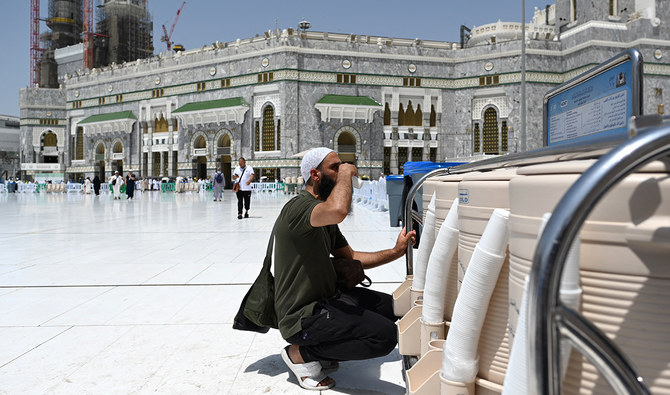ISLAMABAD: The Pakistan Hajj Mission (PHM) has been conducting regular inspections of kitchens run by catering companies to ensure a hygienic food supply to pilgrims arriving in the Kingdom to perform the annual Hajj pilgrimage under the government’s scheme, Pakistani state media reported on Monday.
Hajj is one of the five pillars of Islam and requires every adult Muslim to undertake the journey to the holy Islamic sites in Makkah at least once in their lifetime if they are financially and physically able.
Pakistan has a Hajj quota of 179,210 pilgrims this year, of which around 70,000 people will perform the pilgrimage under the government scheme, while the rest will use private tour operators.
“Determined to maintain quality and hygiene, the PHM is conducting regular and periodic inspections of catering companies’ kitchens,” the state-run APP news agency reported.
A total of nine catering companies were hired to meet the demand of food for approximately 70,105 pilgrims, out of which more than 52,691 have so far arrived in Saudi Arabia via 205 flights since May 9, according to the report.
On Monday, Pakistan Hajj Mission Director in Makkah Faheem Afridi visited kitchens and stores of one of these nine catering companies responsible for preparing breakfast for Pakistani pilgrims.
Afridi said the Hajj mission was implementing an “effective mechanism to ensure food quality, with continuous oversight during food preparation and round-the-clock monitoring of kitchens by Pakistani food coordinators.”
The quality and quantity of food are rechecked when delivered to residential buildings and hotels where the pilgrims have been staying, according to the report. The daily menu includes Pakistani and continental cuisines, which are served thrice a day during flexible timings to avoid any kind of rush.
The PHM director said the mission had imposed penalties on catering firms that failed to ensure the quality of food.
“There have been a total of 13 penalties imposed on eight catering companies so far, most of which were aimed at improving food quality,” he said.
“If any complaints are received regarding meals through the Pak Hajj mobile app or helpline, the catering company is investigated and immediate action is taken.”
The Pakistani religious affairs ministry formed a balanced food menu keeping in view its experience of previous years, according to the official. The food includes meat, lentils, vegetables, rice, two types of bread, yoghurt, fruit, sweets, tea and water.
The Hajj director said Saudi authorities also ensured food quality and hygiene standards for catering companies, requesting pilgrims to cooperate with catering staff and ensure discipline.
On the other hand, a 400-member dedicated Pakistan Hajj Medical Mission (PHMM) is also working around the clock to serve Pakistani pilgrims in Saudi Arabia.
Pakistan has established two hospitals and 11 dispensaries in the Saudi cities of Makkah, Madinah and Jeddah to provide health care to Hajj pilgrims.
This year’s pilgrimage is expected to run from June 14 to June 19. Pakistan’s pre-Hajj flight operation, which began on May 9, will continue until June 9.
Pakistan Hajj Mission ensures hygienic food supply to pilgrims through regular inspections
https://arab.news/r48y7
Pakistan Hajj Mission ensures hygienic food supply to pilgrims through regular inspections

- Hajj Director Faheem Afridi says a total of 13 penalties have been imposed on eight catering firms to improve their service
- Pakistan has hired nine catering companies to fulfil demand of food for approximately 70,105 pilgrims under government scheme
At least 13 civilians killed in Pakistan strikes in Afghanistan, UN says

- Pakistan said it launched the strikes after blaming recent suicide attacks on militants operating from Afghan territory
- The reported toll adds to fears of a renewed cycle of retaliation between the neighbors, threatening a fragile ceasefire
ISLAMABAD/KABUL: At least 13 civilians were killed and seven injured in Pakistani airstrikes in eastern Afghanistan, the United Nations said on Monday, as cross-border tensions escalated following a string of suicide bombings in Pakistan.
The reported toll adds to fears of a renewed cycle of retaliation between the neighbors, threatening a fragile ceasefire along their 2,600-km (1,600-mile) frontier and further straining ties as both sides trade blame over militant violence.
The United Nations Assistance Mission in Afghanistan (UNAMA) said it had received “credible reports” that overnight Pakistani airstrikes on February 21–22 killed at least 13 civilians and injured seven in the Behsud and Khogyani districts of Nangarhar province.
Taliban spokesman Zabihullah Mujahid earlier reported dozens killed or wounded in the strikes, which also hit locations in Paktika province. Reuters could not independently verify the reported toll.
Pakistan said it launched the strikes after blaming recent suicide attacks, including during Ramadan, on militants operating from Afghan territory.
Pakistan’s information ministry in a post on X said the “intelligence-based” operation struck seven camps of the Pakistani Taliban and Daesh (Islamic State) Khorasan Province and that it had “conclusive evidence” the militant assaults on Pakistan were directed by “Afghanistan-based leadership and handlers.”
Kabul has repeatedly denied allowing militants to use Afghan territory to launch attacks in Pakistan.
The strikes took place days after Kabul released three Pakistani soldiers in a Saudi-mediated exchange aimed at easing months of tensions along the border.
Afghanistan’s defense ministry condemned the strikes and called them a violation of sovereignty and international law, saying an “appropriate and measured response will be taken at a suitable time.” The Afghan foreign ministry said it had summoned Pakistan’s ambassador.
In a statement on the February 21-22 strikes, Afghanistan’s education ministry said eight school students; five boys and three girls, were killed in Behsud in Nangarhar province, and one madrasa student injured in Barmal in Paktika province, adding that dozens of other civilians were killed or wounded and educational centers destroyed. Reuters could not independently verify the information.
The latest strikes follow months of clashes and repeated border closures that have disrupted trade and movement along the rugged frontier.










